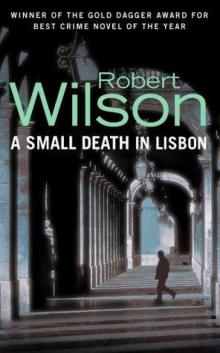A Small Death in Lisbon


Author: Robert Wilson
Category: Other
Published: 1999
Series:
View: 417
Read OnlineWinner of the prestigious Gold Dagger Award in the U.K. for the best mystery of 1999, this complex literary thriller may be one of the most satisfying suspense novels to come along in some time. Robert Wilson has written several political thrillers, most of which are set in West Africa, but they are, alas, largely unavailable in the U.S.
In A Small Death in Lisbon, the narrative switches back and forth between 1941 and 1999, and Wilson's wide knowledge of history and keen sense of place make the eras equally vibrant. In 1941 Germany, Klaus Felsen, an industrialist, is approached by the SS high command in a none-too-friendly manner and is "persuaded" to go to Lisbon and oversee the sale--or smuggling--of wolfram (also known as tungsten, used in the manufacture of tanks and airplanes). World War II Portugal is neutral where business is concerned, and too much of the precious metal is being sold to Britain when Germany needs it to insure that Hitler's blitzkrieg is successful.
Cut to 1999 Lisbon, where the daughter of a prominent lawyer has been found dead on a beach. Ze Coelho, a liberal police inspector who is a widower with a daughter of his own, must sift through the life of Catarina Oliveira and discover why she was so brutally murdered. Her father is enigmatic, her mother suicidal; her friends were rock musicians and drug addicts.
The reader is treated to a wonderful portrait of Lisbon in the aftermath of the 1974 revolution that ousted Salazar from power, and the scars from that conflict are still close to the surface for the citizens of Lisbon, including Coehlo and his colleagues. We also see World War II in a slightly different manner from that to which we are accustomed--through the eyes of the Germans and the Portuguese. The pace of the book is leisurely but compelling as the events of 1941 and those in 1999 merge in an extraordinary climax
In A Small Death in Lisbon, the narrative switches back and forth between 1941 and 1999, and Wilson's wide knowledge of history and keen sense of place make the eras equally vibrant. In 1941 Germany, Klaus Felsen, an industrialist, is approached by the SS high command in a none-too-friendly manner and is "persuaded" to go to Lisbon and oversee the sale--or smuggling--of wolfram (also known as tungsten, used in the manufacture of tanks and airplanes). World War II Portugal is neutral where business is concerned, and too much of the precious metal is being sold to Britain when Germany needs it to insure that Hitler's blitzkrieg is successful.
Cut to 1999 Lisbon, where the daughter of a prominent lawyer has been found dead on a beach. Ze Coelho, a liberal police inspector who is a widower with a daughter of his own, must sift through the life of Catarina Oliveira and discover why she was so brutally murdered. Her father is enigmatic, her mother suicidal; her friends were rock musicians and drug addicts.
The reader is treated to a wonderful portrait of Lisbon in the aftermath of the 1974 revolution that ousted Salazar from power, and the scars from that conflict are still close to the surface for the citizens of Lisbon, including Coehlo and his colleagues. We also see World War II in a slightly different manner from that to which we are accustomed--through the eyes of the Germans and the Portuguese. The pace of the book is leisurely but compelling as the events of 1941 and those in 1999 merge in an extraordinary climax
 Dear Rosie Hughes
Dear Rosie Hughes Ionic Attraction
Ionic Attraction Grind (One Night Book 2)
Grind (One Night Book 2) Destiny's Path
Destiny's Path Where There's Smoke
Where There's Smoke Mother of Learning 3 - Finale
Mother of Learning 3 - Finale Germinal
Germinal Rooming With the Supernatural
Rooming With the Supernatural